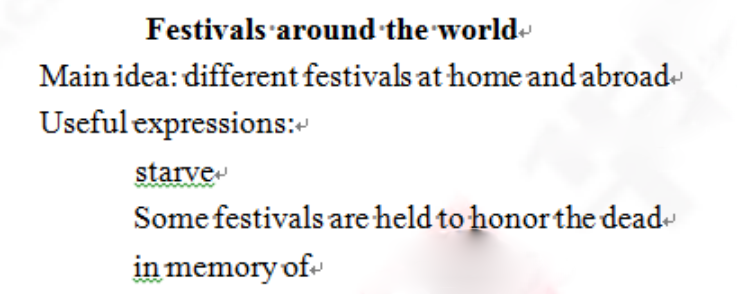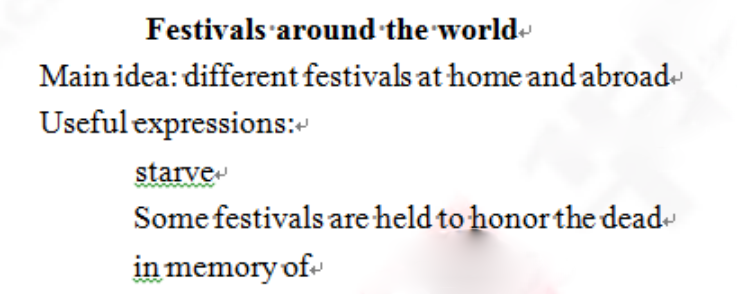关键词: 全国招教
高中《Festivals around the world》
1.题目:Festivals around the world
2.内容:

3.基本要求:
(1)试讲时间约10分钟,用英语授课;
(2)根据教学内容进行教学设计,体现课堂导入,呈现读前,读中,读后等环节;
(3)综合教学内容进行板书,板书有利于学生学习。
教案
Teaching objectives:
1. Students can get the main idea of the passage.
2. Students can improve their reading and writing abilities by finishing some activities and tasks.
3. Students can know that each country has their own festivals. We have to pay more attention to our traditional festivals.
Key points:
Students can use some reading strategies like skimming, scanning and intensive reading to get the main idea of the text and find out some detailed information.
Difficult points:
Students can improve their reading abilities.
Students can know that each country has their own festivals. We have to pay more attention to our traditional festivals.
Teaching Procedure:
I. Lead-in
1. Greeting.
2. Play the song: Jingle Bell and ask students: are you familiar with this song? When can we hear it?
II. Pre-reading
Teacher shows pictures on the PPT and asks students: can you tell me what festivals are they? And how do you know about these festivals. They can talk about them freely.
III. While-reading
Skimming:
Teacher asks students to find out what the passage is mainly about.
Scanning
Teacher asks students to read the passage again and do a Matching Exercise. And then correct them if students make some mistakes.
Careful reading
1. Teacher asks students to read the passage carefully again and to guess the meaning of the word “starve” through the context.
2. Teacher asks students to think about the meaning of this sentence: “Some festivals are held to honor the dead.” And try to make a sentence using this pattern.
3. Teacher asks students to think about the meaning of the phrase “in memory of”.
4. Teacher asks students to think about the question before class: “Can you tell me why the Mid-autumn festival happy events?”
IV. Post-reading
Task: Do a game
Teacher asks students work in group and six in a group. Supposed one of their foreign friends Thomas wants to celebrate the oncoming Dragon Boat Festival together with them. What would happen among them and Thomas? Try to create a short play in such a situation. Five minutes later. Each group shall show their results.
V. Summary
Students summarize what they have learnt in this lesson and the teacher gives supplements if necessary. Enlarge students to know that each country has their own festivals. We have to pay more attention to our traditional festivals.
VI. Homework
Students have to search more information about festivals at home and abroad, and share with us next class.
VII. Blackboard design

试讲逐字稿:
I. Lead-in
T: Good morning, everyone, how are you today! Thank you, I am great. Hope you all have a good day.
T: Let’s start. At first, we will enjoy a song.
T: OK, the song is over. This is a happy song, am I right? So, are you familiar with this song? When can we hear it?
S: Yes, we can hear it on Christmas Day. The name of this song is Jingle Bell.
T: Wonderful! As we all know, Christmas is a very important festival in many foreign countries. We always compared it with our Spring Festival. Right? But, we celebrate them in different ways. Then, do you know their origin? How many festivals do you know around the world? This lesson we will learn more about it!
II. Pre-reading
T: OK, look at these pictures please. Are they beautiful?
S: Yes, they are beautiful. Can you tell me what festivals are they? And how do you know about these festivals. Two minutes. You can talk about them freely.
S: …
T: Time is up. So, who wants to tell me your answer?
S: …
T: Wow, so many students want to answer my question, you are so active. Who should I choose? Let me see. How about Diana?
S: …
T: Thank you and sit down please. Exactly right. The first one is Spring Festival, the second one is Dragon Boat Festival, the third one is Christmas Day and the last one is Thanksgiving Day.
III. While Reading
T: Turn to page 1. You are supposed to skim the passage and try to find out what’s the passage mainly about? You may have two minutes.
S: …
T: Have you finished?
S: Yes!
T: Nice. Who wants to be the first one? Oh, David, brave boy!
S: The article mainly talks about different festivals at home and abroad, people have different ways to celebrate their own festival.
T: Very logical answer, sit down please.
T: Look at the PPT. Here is a Matching Exercise. Would you please finish it by scanning the passage?
T: Ok! Let’s do it!
T: Hey, guys, let’s just stop here! Have you found the answers? Tracy, can you do it?
T: Yeah, excellent work. Sit down please. Any other opinions?
T: Oh, Ann, what’s your answer? Well done. Sit done please. Do you agree with her? Yes, all right. Tracy, don’t feel sad! Everybody makes mistakes. I am still proud of you.
T: Now, let’s look at the article together. Can you guess the meaning of “starve” through the context? Abby? You said it means hunger. Nicely done! Starve means suffer from great hunger indeed. We always use this phrase starve to death.
T: Let’s move on. Please pay attention to this expression, “some festivals are held to honor the dead”, can you understand the meaning of this sentence? Yes, it’s easy to understand. How can we use it? You please.
S: We can use it to describe the purposes of a festival.
T: Wow, amazing! Sit down please. Try to make a sentence using this pattern.
S: …
T: I noticed all of you have worked hard on it. Who wants to have a try? Alice, brave girl.
S: The Dragon Boat Festival is held to honor a famous poet.
T: Great, sit down please. Who can tell me the meaning of “in memory of”?
S: …
T: A little bit difficult. Just have a try. Oh, Dean, my brave boy.
S: In memory of sb. Means in order to remember sb.
T: Excellent work, you got the right answer. So much for expressions and patterns. I know that you have done a lot of preparation.
T: Before class. And we have talked about festivals a lot. So can you tell me why the Mid-autumn festival happy events? Who wants to have a try? Wow, so many students want to answer my question, who should I choose? How about hot potatoes?
S: Ok!
T: Ready, go.
T: Gaby, how lucky you are! Give us your reasons, please.
S: We always have family reunio on that day. Family members eat moon cakes together, and I like moon-cakes so much. Besides, people celebrate their harvest as well.
T: So, the Mid-autumn festival must be a happy event. Amazing! A very logical, acceptable and comprehensive answer. Thank you very much, sit down please. So, are we clear about the whole passage? Great.
IV. Post-reading
T: Next part, let’s do a game! Six in a group. Supposed one of your foreign friends Thomas wants to celebrate our oncoming Dragon Boat Festival together with you. What would happen among you and Thomas? Try to create a short play in such a situation. Five minutes later. Each group shall show your results.
S: …
T: Time’s over. Show time! How about group 1.
S: …
T: Go back to your seat. Do you like their performance? Yes, so funny. Many ridiculous things happened among them.
V. Summary
T: Now, boy in the last row, would you please tell us what we have learnt today?
S: …
T: Exactly. We learn some language points and know more about festivals all over the world. So, we know that each country has their own festivals. We have to pay more attention to our traditional festivals. Right?
S: Yes!
T: How time flies! The bell is ringing. Did you enjoy your English travel? Glad you are happy. I am happy, too. You all have done a great job in today’s lesson!
VI. Homework
T: So, after class, review this article and prepare for next class. And search more information about festivals at home and abroad. Next class, share your information and review. OK? Great! So much for today, see you next time.
VII. Blackboard Design

答辩:
1. What are the key points and difficult points of this class?
【参考答案】
Key points:
Students can use some reading strategies like skimming, scanning and intensive reading to get the main idea of the text and find out some detailed information.
Difficult points:
Students can improve their reading abilities.
Students can know that each country has their own festivals. We have to pay more attention to our traditional festivals.
2.请说一下英语常见的时态。
【参考答案】
英语动词有16种时态,但是常见的有:一般现在时、一般过去时、一般将来时、过去将来时、现在进行时、过去进行时、将来进行时、现在完成进行时、现在完成时、过去完成时、将来完成时等。

2024年教师招聘官方微信客服
手机微信扫描左侧二维码,添加客服老师微信领取
相关推荐:
手机登录下载
微信扫码下载
微信扫一扫,即可下载